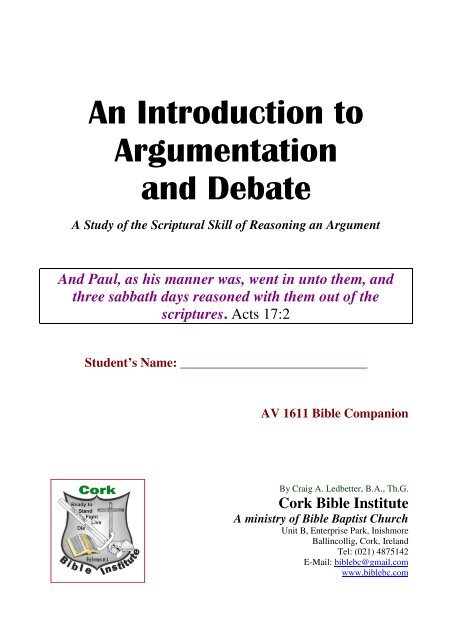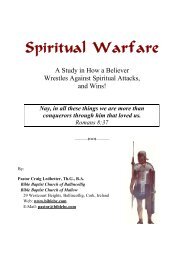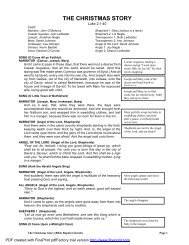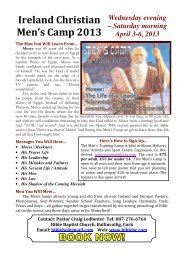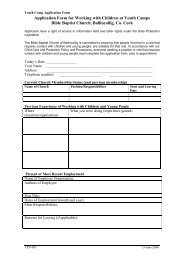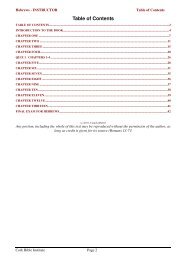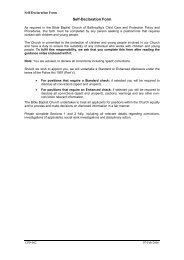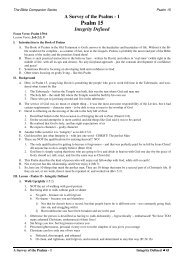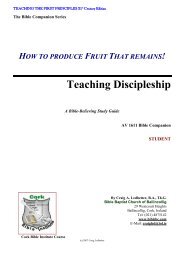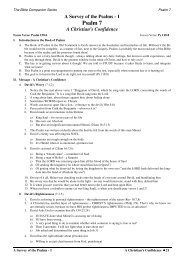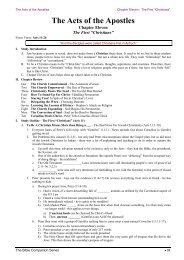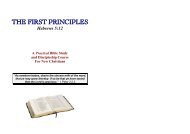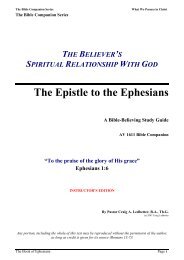An Introduction to Argumentation and Debate - Bible Baptist Church
An Introduction to Argumentation and Debate - Bible Baptist Church
An Introduction to Argumentation and Debate - Bible Baptist Church
You also want an ePaper? Increase the reach of your titles
YUMPU automatically turns print PDFs into web optimized ePapers that Google loves.
<strong>An</strong> <strong>Introduction</strong> <strong>to</strong><strong>Argumentation</strong><strong>and</strong> <strong>Debate</strong>A Study of the Scriptural Skill of Reasoning an Argument<strong>An</strong>d Paul, as his manner was, went in un<strong>to</strong> them, <strong>and</strong>three sabbath days reasoned with them out of thescriptures. Acts 17:2Student’s Name: _____________________________AV 1611 <strong>Bible</strong> CompanionBy Craig A. Ledbetter, B.A., Th.G.Cork <strong>Bible</strong> InstituteA ministry of <strong>Bible</strong> <strong>Baptist</strong> <strong>Church</strong>Unit B, Enterprise Park, InishmoreBallincollig, Cork, Irel<strong>and</strong>Tel: (021) 4875142E-Mail: biblebc@gmail.comwww.biblebc.com
<strong>Argumentation</strong> <strong>and</strong> <strong>Debate</strong>Table of ContentsTable of ContentsTable of Contents .................................................................................................................... 2Course Requirements .............................................................................................................. 3<strong>Introduction</strong> <strong>to</strong> <strong>Argumentation</strong> <strong>and</strong> <strong>Debate</strong> ............................................................................ 4Foundations of Thought.......................................................................................................... 7The Priority of <strong>Debate</strong>............................................................................................................. 8His<strong>to</strong>ry of <strong>Debate</strong> – Rhe<strong>to</strong>ric ................................................................................................ 11Formal versus Practical <strong>Debate</strong>s........................................................................................... 13Logic <strong>and</strong> Thinking Skills..................................................................................................... 14Critical Thinking ................................................................................................................... 22Studying Your View.......................................................................................................... 22Defining Your Terms ........................................................................................................ 25Testing Your Evidence...................................................................................................... 29Deciding What To <strong>Debate</strong>..................................................................................................... 31Speech <strong>and</strong> Delivery – Communication Skills ..................................................................... 32Preparing for Your Audience ............................................................................................ 32Persuading Your Audience................................................................................................ 32Staying On Topic............................................................................................................... 32The Class <strong>Debate</strong> .................................................................................................................. 33FINAL EXAM ...................................................................................................................... 34Page 2
<strong>Argumentation</strong> <strong>and</strong> <strong>Debate</strong>Cork <strong>Bible</strong> InstituteCourse RequirementsCourse RequirementsBooks <strong>and</strong> Resourceso The most important book you will need for this course is the <strong>Bible</strong>. It is the foundation oftrue knowledge in all subjects, including public speaking <strong>and</strong> debate. It is a guide for use ofthe <strong>to</strong>ngue, <strong>and</strong> it is the st<strong>and</strong>ard by which we should judge all books about speech <strong>and</strong>debate.o <strong>An</strong> <strong>Introduction</strong> <strong>to</strong> <strong>Argumentation</strong> <strong>and</strong> <strong>Debate</strong> by Christy L. Shipe. You will read atassigned times pages 1 – 76, as well as 163-174.o Finally, you don’t have <strong>to</strong>, but it is recommended that you get a book authored by the lateDr. Greg Bahnsen, entitled Always Ready: Directions for Defending the Faith. This booktreats the subject of apologetics, or how we should defend the Christian faith, including inour speech. It is published by Covenant Media Foundation, <strong>and</strong> can be purchased at thewebsite http://www.cmfnow.com/product.asp?0=203&1=209&3=710 .o In addition <strong>to</strong> reading these books, as part of the course, students will need <strong>to</strong> listen <strong>to</strong> “TheGreat <strong>Debate</strong>” between Bahnsen <strong>and</strong> Stein. It can be listened <strong>to</strong> free on-line at such sites ashttp://www.straitgate.com/bahnsen/ . Or, tapes or audio files of the debate can be purchasedat such websites as http://www.cmfnow.com/subcat.asp?0=207 <strong>and</strong>http://www.pointsouth.com/Merchant2/merchant.mvc?Screen=PROD&Product_Code=BAHNSENG-STEIN&Category_Code=FT&S<strong>to</strong>re_Code=ABS . The debate will need <strong>to</strong> belistened <strong>to</strong> later in the course, so make sure you will be able <strong>to</strong> listen <strong>to</strong> it when that timecomes.Class <strong>Debate</strong> Exerciseo The class will be grouped in<strong>to</strong> two groups of debate teamso There will be at least one debate <strong>to</strong>wards the end of the Semester where you will have <strong>to</strong>present well researched arguments in a passionate yet orderly fashion for the purpose ofturning them minds of the audience <strong>to</strong> your way of thinking.Scoringo Your note taking ability will represent 25% of your grade – both the notes in this StudentOutline but also notes during <strong>Debate</strong>so The Class <strong>Debate</strong> will make up 50% of your gradeo The final exam will make up 25%Page 3
<strong>Argumentation</strong> <strong>and</strong> <strong>Debate</strong><strong>Introduction</strong> <strong>to</strong> <strong>Argumentation</strong> <strong>and</strong> <strong>Debate</strong><strong>Introduction</strong> <strong>to</strong> <strong>Argumentation</strong> <strong>and</strong> <strong>Debate</strong>I. <strong>Debate</strong>s are ____________ in the <strong>Bible</strong>A. Rarely do people agree at first.1. People need <strong>to</strong> be reasoned with <strong>and</strong> debated – not just left alone, like our modern meonlyphilosophy dictates!2. ______ need <strong>to</strong> be reasoned with <strong>and</strong> prodded <strong>to</strong> think through both your actions,attitudes, <strong>and</strong> beliefs.B. It is right <strong>and</strong> good <strong>to</strong> reason things out <strong>and</strong> <strong>to</strong> test truths. Not everything we think is true, is.C. Our modern generation has no time for truths – people only want the minimal amount ofeffort <strong>to</strong> find out what they can get away with – ________________D. The <strong>Bible</strong> is the presentation of one side of a debate – ____________________.E. Almost every Book in the <strong>Bible</strong> contains dozens if not hundreds of debates between:1. Believers <strong>and</strong> non-believers2. Spiritual <strong>and</strong> Carnal believers (1Corinthians)3. Christians <strong>and</strong> Jews4. God <strong>and</strong> discouraged followers5. Husb<strong>and</strong>s <strong>and</strong> wives6. Civil leaders <strong>and</strong> their general populations7. Men <strong>and</strong> their soulsF. Here are some specific examples (we will look at some of these in much more detail later):1. Job is a Book that describes Job’s debate first with his ________, then with his______________, then with __________ <strong>and</strong> the finally with ______ Himself (Job13:3; 32:12)!2. Moses reasoned with the nation of Israel on dozens of occasions3. God reasoned with Pharaoh <strong>to</strong> get him <strong>to</strong> let the Jews go – didn’t just take them!4. The Judges in the Old Testament heard arguments <strong>and</strong> had <strong>to</strong> make decisions based onthose arguments, for or against people5. Samuel reasoned with the nation of Israel (1Sam 12:7)6. Jesus regularly debated with His audiencesa. Jesus debated about the resurrectionb. He debated with Nicodemus about the new birth in John 3c. He was challenged about paying taxesd. He was challenged about how <strong>to</strong> keep the Sabbathe. He was challenged about His own authority <strong>to</strong> do miracles (Mk 11:27-33)f. He was challenged concerning His ability <strong>to</strong> forgive sin (Luke 5:18-26)g. Jesus debated with Pilate in John 187. The First century Christians constantly argued their point of the resurrection of the dead,<strong>and</strong> the fulfilment of prophecya. They were comm<strong>and</strong>ed <strong>to</strong> go <strong>and</strong> publically debate people with the Gospel (Acts5:20)b. They met people in the open, in markets (Acts 17:17), <strong>and</strong> in homes, <strong>and</strong> theypresented the facts of the Gospel, <strong>and</strong> the need <strong>to</strong> repentc. Paul always reasoned with <strong>and</strong> debated with the Jews especially about theMessiahship of Jesus Christ (Acts 17:2; Acts 18:19)d. <strong>An</strong>d Paul reasoned with the pagans (Acts 24:25)Page 4
<strong>Argumentation</strong> <strong>and</strong> <strong>Debate</strong>II. The Goal <strong>and</strong> Purpose of Learning <strong>Debate</strong><strong>Introduction</strong> <strong>to</strong> <strong>Argumentation</strong> <strong>and</strong> <strong>Debate</strong>A. The s<strong>to</strong>ics <strong>and</strong> epicureans of Greece loved debating, but for the wrong reason – just forargument’s sake – they just loved <strong>to</strong> argue!B. 2Tim 3:7 Ever learning, <strong>and</strong> never able <strong>to</strong> come <strong>to</strong> the knowledge of the truth.C. Modern “<strong>Debate</strong>” philosophy seeks only <strong>to</strong> be the best performer – not the winner of theargument. Quote: “Facts do not matter, only who debates the BEST!”. People <strong>to</strong>day areafraid of winning or losing debates <strong>and</strong> instead just argue for the fun of it, or for theadrenalin, of for the power they can wield (see political debaters).D. The goal of any Christian debater is <strong>to</strong> persuade people <strong>to</strong> believe the <strong>Bible</strong>, <strong>and</strong> <strong>to</strong> followJesus Christ (Act 18:4; 13:43; 19:26; 26:28)E. God’s people used debate <strong>and</strong> argumentation as weapons instead of war <strong>and</strong> fightingF. To do this, you have <strong>to</strong> have answers, <strong>and</strong> skill in reasoning (1Peter 3:15) “But sanctify theLord God in your hearts: <strong>and</strong> be ready always <strong>to</strong> give an answer <strong>to</strong> every man that askethyou a reason of the hope that is in you with meekness <strong>and</strong> fear.”G. This course will only begin <strong>to</strong> help you develop the following skills:1. Abstract thinking – thinking through truths that st<strong>and</strong> on their own2. <strong>An</strong>alytical thinking – learning how <strong>to</strong> examine every truth a person claims <strong>to</strong> hold <strong>to</strong>3. Etiquette – learn <strong>to</strong> speak the truth in love4. Cross-examination/questioning – always making every truth st<strong>and</strong> up <strong>to</strong> testing5. Point of view – learning how <strong>to</strong> see each other’s points of view on a subject6. Distinguishing fact from opinion – this is vital because most held beliefs are fiction7. Identifying bias – whether in your opponent, or especially in yourself8. Research – learning how <strong>to</strong> study out a truth9. Organization of information – how <strong>to</strong> organize the information about a subject that youare collecting10. Teamwork/cooperation – learning <strong>to</strong> work as part of a greater whole than just yourself11. Persuasion – how <strong>to</strong> actually change your opponent’s mind12. Public speaking – not being afraid <strong>to</strong> present truth in publicH. Debating can become sinful when they are an end in themselves – when you argue just forargument’s sake. When you don’t really care about the other side, <strong>and</strong> are not respectfulenough <strong>to</strong> listen <strong>to</strong> their side (Rom 1:29; 2Cor 12:20)III. Biblical definitionsA. <strong>Debate</strong>: a competition in which two opposing teams make speeches <strong>to</strong> support theirarguments <strong>and</strong> disagree with those of the other team.B. Resolution: the opinion about which two teams argue.C. <strong>An</strong> Affirmative team: agrees with the resolution.D. A Negative team: disagrees with the resolution.E. A Rebuttal: explains why one team disagrees with the other team.F. Judges: decide the winner.G. Argue (Job 6:25) – <strong>to</strong> offer reasons <strong>to</strong> support or overthrow a proposition, opinion ormeasure. There is nothing wrong with arguing if it is done as an adult. Children are notallowed <strong>to</strong> argue <strong>and</strong> debate.H. Reason (Job 13:3). To arrange <strong>and</strong> present the reasons for or against an opinion; <strong>to</strong> examineor discuss a stated fact by arguments; <strong>to</strong> debate or discuss with the goal of persuading theother person.I. Adversary (Mt 5:25). The opposing person. Be careful <strong>to</strong> not see every opponent as youradversary. Just be quick <strong>to</strong> settle arguments before they become court cases!!!J. Advocate – those siding with you <strong>and</strong> st<strong>and</strong>ing for youK. Prove (Mal 3:10) – To establish a statement as true by testing <strong>and</strong> thorough examinationPage 5
<strong>Argumentation</strong> <strong>and</strong> <strong>Debate</strong><strong>Introduction</strong> <strong>to</strong> <strong>Argumentation</strong> <strong>and</strong> <strong>Debate</strong>L. Subverting (2Tim 2:14) – changing your opponent’s mind, getting truth <strong>to</strong> take over theirway of livingM. Disputing (Acts 19:8) - <strong>to</strong> argue against something maintained, upheld, or claimed, byanother. Here in this verse, Paul was disputing the Jewish ideas against Jesus being theMessiahN. Persuading (Acts 28:23) - To convince by argument, or by reasons offered or suggestedfrom reflection, etc.; <strong>to</strong> cause <strong>to</strong> believe (Heb 6:9)O. Pleading (Isa 43:26; Job 16:21) - To argue in support of a claim, or in defense against theclaim of another; <strong>to</strong> urge reasons for or against a thingP. Fair <strong>Debate</strong> (Ezek 18:25) – Not judging on circumstantial evidence, but according <strong>to</strong>established facts <strong>and</strong> truths (Isa 11:3,4)Q. Judge, Judging, <strong>and</strong> Justifying (Psalm 51:4) – make conclusionsR. Entering In<strong>to</strong> Judgment – in<strong>to</strong> a court case for final judgment, for or against you!S. Accuse (Acts 24:13) – <strong>to</strong> charge with a fault, or <strong>to</strong> claim something is not trueT. Opening <strong>An</strong>d Alleging (Acts 17:2,3) – making initial declarations from one side <strong>and</strong>opinionU. Cross-Examining <strong>and</strong> Verifying (Acts 17:11) – never believing something simply becausesomeone says something – it has <strong>to</strong> have 2 or 3 witnesses.Page 6
<strong>Argumentation</strong> <strong>and</strong> <strong>Debate</strong>Foundations of ThoughtFoundations of Thought<strong>An</strong>d he said un<strong>to</strong> him, If they hear not Moses <strong>and</strong> the prophets, neither will they be persuaded,though one rose from the dead. Luke 16:31I. Foundations are important.A. They are the structures upon which buildings are constructed. If the foundations are faulty,the whole building will be weak. So we begin this course on public speaking <strong>and</strong> debate byconsidering the foundations upon which we build our beliefs upon.B. The only sure foundation of every human endeavour, all human underst<strong>and</strong>ing, all humanspeech, yea, everything, is the word of God, the <strong>Bible</strong>. It is here that we find the infalliblewords of the Lord Jesus Christ. Miracles, <strong>and</strong> feelings DO NOT decide the truth. Abraham<strong>to</strong>ld the rich man in hell that his brothers had <strong>to</strong> repent based upon____________________________, not based upon a miracle. All our decisions <strong>and</strong> choicesmust be based upon the solid foundation of the written words of God (Mt 7:24-27).C. There simply is no substitute for the foundation of God’s word.1. Human ______________ is no sure foundation, for it rests upon many assumptions offallible men. Science used <strong>to</strong> be all about discovering truth, but now, no scientist admits<strong>to</strong> believing anything is true.2. The pronouncements of other __________________ or philosophies are no surefoundation, for they <strong>to</strong>o ultimately are but the speculations of fallible men.3. Only the infallible words of the omniscient God are worthy of our faith as thefoundation of our thoughts, speech, <strong>and</strong> conduct.4. Why is the <strong>Bible</strong> different? Because it has proven facts behind it in seven distinct,verifiable areas:a. ______________________________________.b. ______________________________________.c. ____________________________________________.d. ________________________________________________________.e. ____________________________________.f. ________________________.g. Its claim <strong>to</strong> be ____________________________________________________.II. The defence of the Christian faith is called ______________________.A. It is called “apologetics” because it is ____________________ the reason we believe, notapologizing for that belief. Even when we are not directly giving a defence of the Christianfaith, we must make sure that our words reflect our foundational faith in the word of God.By so doing, our speech on a broad range of <strong>to</strong>pics serves as a witness of our Christian faith.Our speech therefore operates as an apology (in the sense that term means______________) for the Christian faith even in a diverse array of circumstances.B. Proverbs 26:4-5 provides a two-fold apologetic procedure.1. Don’t answer a fool’s attacks when?2. But DO answer a fool’s attacks when?C. What would be the result if we trusted our own intellectual powers or the teachings of theso-called experts more than we trusted the veracity of God’s revelation?III. Before next week, READ pages 1-9 in your textbook.Page 7
<strong>Argumentation</strong> <strong>and</strong> <strong>Debate</strong>The Priority of <strong>Debate</strong>The Priority of <strong>Debate</strong>Ephesians 5:10 Proving what is acceptable un<strong>to</strong> the Lord.I. <strong>Debate</strong> is a VERY important part of a Christian’s life.A. It forms a mindset that tests <strong>and</strong> proves what is right – not so that you can look for reason <strong>to</strong>NOT obey God, but always testing things <strong>to</strong> make sure that you actually ARE obeying God<strong>and</strong> not your own fleshly whims!B. <strong>An</strong> example would be of a Christian making sure they are ______________, making sure ofGod’s will for their life (Romans 12:2)C. <strong>An</strong>other example involves determining if what you believe is biblical, or traditional, or onlyconvenient.D. The best example of how important debate is, is the need for every person <strong>to</strong> prove Christ’sresurrection <strong>and</strong> accept it as THE proof that everyone must repent <strong>and</strong> believe the Gospelbecause that person who rose from the grave is going <strong>to</strong> judge the whole world (Acts 17:31)II. WHY LEARN TO DEBATE?A. There are many important reasons <strong>to</strong> learn the art of debate. First <strong>and</strong> foremost, a formalstyle of debate is a <strong>to</strong>ol that you can use <strong>to</strong> fulfil the two greatest comm<strong>and</strong>s of Scripture: <strong>to</strong>love the Lord with all of your heart, soul, strength, <strong>and</strong> mind <strong>and</strong> <strong>to</strong> love your neighbour asyourself (Matthew 22:36-40).B. The study of debate is one way that you can greatly develop your critical thinking skills <strong>and</strong>thus improve the ability of your mind <strong>to</strong> love the Lord. Although God has granted us theability <strong>to</strong> reason, He does not wave a w<strong>and</strong> over our minds <strong>to</strong>C. magically make them think logically, learn how <strong>to</strong> properly analyze arguments, studyimportant issues, form conclusions, <strong>and</strong> think through the best way <strong>to</strong> communicate ourbeliefs <strong>to</strong> others. Instead, He expects us <strong>to</strong> be good stewards of the minds He has given usby actively disciplining <strong>and</strong> training them <strong>to</strong> think rightly (Romans 12:2; Ephesians 4:22-24; Philippians 4:8; Colossians 3:2; 1 Peter 1:13).D. By studying debate methods, you will develop important mental skills that God can greatlyuse if you choose <strong>to</strong> let Him. It is very important <strong>to</strong> remember that debate itself is only a<strong>to</strong>ol. That <strong>to</strong>ol can be used for good or for evil. In order <strong>to</strong> learn debate in a way that willallow you <strong>to</strong> love the Lord with all of your mind, you must constantly submit yourself (<strong>and</strong>your mind) <strong>to</strong> His lordship. Submitting your mind <strong>to</strong> the lordship of Christ means that youwill base all of your thinking, reasoning, <strong>and</strong> conclusions upon the highest truth that exists,which is the Word of God.E. Submitting <strong>to</strong> the lordship of Christ also means that you will use your debate skills <strong>to</strong> loverather than <strong>to</strong> hurt others. You cannot fulfil the greatest comm<strong>and</strong>ments by using debateskills <strong>to</strong> disrespect your parents, show off <strong>to</strong> your friends, or cut someone down. Instead,God wants <strong>to</strong> use you <strong>and</strong> the communication skills you will learn in debate <strong>to</strong> reach otherswith the truth of the gospel (Romans 10: 14), <strong>to</strong> build up others (Ephesians 4:29), <strong>to</strong>demolish lies <strong>and</strong> replace them with truth (2 Corinthians 10:5), <strong>and</strong> <strong>to</strong> st<strong>and</strong> up for thosewho cannot defend themselves (Proverbs 24: 11; Isaiah 1: 17). Learning formal debate willgreatly increase your ability <strong>to</strong> communicate effectively for God.F. <strong>Debate</strong> can teach you skills such as how <strong>to</strong> ask penetrating questions, respond graciously<strong>and</strong> accurately <strong>to</strong> an opponent's attacks, organize information, <strong>and</strong> communicate complexideas in simple ways. Simply learning <strong>to</strong> think analytically <strong>and</strong> evaluate arguments willtremendously benefit you. No matter what you plan <strong>to</strong> do with your future: become apreacher, a lawyer, an engineer, a plumber, a mother, a doc<strong>to</strong>r, or a teacher-you will facesituations in which you must be able <strong>to</strong> give an answer for what you believe, often in theface of another's arguments. Whether you are witnessing <strong>to</strong> someone about the gospel,Page 8
<strong>Argumentation</strong> <strong>and</strong> <strong>Debate</strong>The Priority of <strong>Debate</strong>applying for a job, trying <strong>to</strong> convince someone <strong>to</strong> take action on a political issue, or readingthe newspaper, the skills developed by debate are invaluable.G. Finally, experienced debaters will tell you that the activity is one of the most invigorating<strong>and</strong> exciting experiences you can have. Formal debate is very challenging-even scary <strong>and</strong>intimidating-but it can also be a lot of fun.III. More than a GameA. It is important <strong>to</strong> think of debate as learning a life skill rather than playing a game.B. <strong>Debate</strong> practiced as a game tends <strong>to</strong> train speakers who can only communicate well withpeople who underst<strong>and</strong> the rules of the game.C. <strong>Debate</strong> practiced as a life skill, on the other h<strong>and</strong>, tends <strong>to</strong> train speakers who cancommunicate with anyone, regardless of the person's knowledge of debate theory.D. The goal of playing a game is winning that game.E. The goal of learning a life skill is the practical <strong>and</strong> effective application of that skill in thereal world. As you begin <strong>to</strong> learn debate, keep your eye on the prize of learning practicallife skills rather than winning trophies <strong>and</strong> awards at a debate <strong>to</strong>urnament.IV. Speaking The Truth In Love (Ephesians 4:15)A. Act_20:19 Serving the Lord with all ____________________, <strong>and</strong> with many tears, <strong>and</strong>temptations...B. God’s moral law is summarized in the Ten Comm<strong>and</strong>ments. This is the law which waswritten on tables of s<strong>to</strong>ne by God for His people in the Old Testament, <strong>and</strong> it is the rule oflife written on the hearts of Christian believers in all ages by the Spirit of God (2Corinthians 3:3, Jeremiah 31:33). The comm<strong>and</strong>ment that perhaps most pertains <strong>to</strong> ourpublic speech is the ninth comm<strong>and</strong>ment, which directs us as follows:“Thou shalt not bear false witness…”C. All of our conversation should then be governed by the principle that we must speak thetruth. As the Apostle Paul reminds us: “Wherefore putting away lying, speak every mantruth with his neighbour…” (Ephesians 4:25).D. God never gives man the right <strong>to</strong> lie, either concerning divine issues or human issues.1. It does not matter whether we are a high school debater engaged in debate competitionor a lawyer presenting a case before a jury.2. It does not matter whether we are a preacher teaching his congregation on religion or ahomemaker correcting her children.3. Sometimes it may appear immediately advantageous <strong>to</strong> lie, but we must refrain, even ifthe cost seem great. In all cases, truth must be our guide.E. Now this does not mean we are always required <strong>to</strong> speak everything we know. Perceivingthe trap being laid by the Pharisees, Jesus often refrained from speaking directly <strong>to</strong> them.Similarly, if a wicked regime is seeking <strong>to</strong> kill the innocent, we are not required or evenadvised <strong>to</strong> go tell such a regime where the innocent are hiding. Jonathan did not tell hiswicked father Saul where David was hiding. So we must “be as wise as serpents <strong>and</strong> asharmless as doves” in our speech.F. We must be knowledgeable. Ignorant people generally speak falsehoods, evenunintentionally. As we read in Hosea 4:6, “My people are destroyed for lack of knowledge:because thou hast rejected knowledge, I will also reject thee, that thou shalt be no priest<strong>to</strong> me: seeing thou hast forgotten the law of thy God, I will also forget thy children.” Theconsequences of lack of knowledge – especially knowledge of God’s word – are grave. Godgives men over <strong>to</strong> all sorts of wickedness who lack knowledge. “Swearing, <strong>and</strong> lying, <strong>and</strong>killing, <strong>and</strong> stealing, <strong>and</strong> committing adultery” (Hosea 4:2) are but some of its fruits. SoPage 9
<strong>Argumentation</strong> <strong>and</strong> <strong>Debate</strong>Page 10The Priority of <strong>Debate</strong>we must become well informed if we are <strong>to</strong> speak the truth. It starts with becoming wellinformed in God’s word. It is the fountain of life <strong>and</strong> the foundation of all true knowledge.G. His<strong>to</strong>ry did not cease in the Apos<strong>to</strong>lic era. So we must study his<strong>to</strong>ry from the ancient past <strong>to</strong>the present, evaluating his<strong>to</strong>ry according <strong>to</strong> scriptural principles. <strong>An</strong>d we must study God’screation, building upon the information revealed in scripture with additional insights in<strong>to</strong>how God has ordered the world.H. <strong>An</strong>d we must study __________ <strong>to</strong> insure we are thinking coherently <strong>and</strong> consistently.Indeed, there are many areas we must study <strong>to</strong> rid ourselves of ignorance. But simplybecause we are speaking truth based upon true knowledge does not mean we are necessarilyspeaking as well as we should. Speaking itself requires skill. It takes skill <strong>to</strong> present whatwe know in an organized fashion that others can underst<strong>and</strong>. Christian men should beprepared in communication <strong>and</strong> speech. For we are encouraged <strong>to</strong> “be ready always <strong>to</strong> givean answer <strong>to</strong> every man that asketh you a reason of the hope that is in you with meekness<strong>and</strong> fear…” (1 Peter 3:15) <strong>An</strong>d the ability <strong>to</strong> speak, especially publicly, requires practice.I. One excellent way, especially for young men, <strong>to</strong> obtain practice in public speaking isthrough formal public debate. This course introduces you <strong>to</strong> public debate as one means <strong>to</strong>equip you in public speaking. Hopefully, as you acquire skills in public debate, you will beable <strong>to</strong> employ the skills <strong>to</strong> public speaking in general.J. Now the view of human speech outlined in scripture is markedly different from theprevalent humanist notion of speech.1. Whereas the <strong>Bible</strong> declares the requirement that our speech be ________________, thehumanist notion declares it should be ________.2. In chapter 1 of <strong>An</strong> <strong>Introduction</strong> <strong>to</strong> <strong>Argumentation</strong> <strong>and</strong> <strong>Debate</strong>, John Mil<strong>to</strong>n is quoted assaying, “Give me the liberty <strong>to</strong> know, <strong>to</strong> utter, <strong>and</strong> <strong>to</strong> argue freely according <strong>to</strong>conscience, above all liberties.” It is little wonder that Mil<strong>to</strong>n placed such a highemphasis on freedom (so called) rather than truth in accordance with God’s word, forJohn Mil<strong>to</strong>n (1608–1674) was a Unitarian. (See his work De Doctrina Christiana.) <strong>An</strong>dit should not surprise us that the Founding Fathers of America followed suit with thesame notion in the constitutional framework of the United States. In America during the18th century, French <strong>and</strong> English Deism <strong>and</strong> rationalism made Unitarians of many ofour founding fathers. Benjamin Franklin, Thomas Jefferson, John Adams, ThomasPaine, James Madison <strong>and</strong> James Marshall were all Unitarians. They overthrew thereformed <strong>and</strong> Puritan order which dominated most of the colonial American era.K. God never gave men a right <strong>to</strong> speak falsehood (such as the advocacy of Unitarianism)under the pretence of “freedom of speech”.1. Jesus Christ Himself rebuked the Jews for circumventing the comm<strong>and</strong> <strong>to</strong> put children<strong>to</strong> death who cursed their parents. Jesus certainly did not believe children had the“right” <strong>to</strong> speak their mind <strong>to</strong> parents, when that mind was evil.2. Obviously freedom of speech has limits – especially where lies are involved.L. In truth, once humanists gained the upper h<strong>and</strong> in government, they were not so generous asthey claimed in their vaunted principle of “freedom of speech”.1. Let a Christian teacher try <strong>to</strong> teach the truth about Darwinian evolution in public school,<strong>and</strong> see what happens.2. <strong>An</strong>d let a Christian valedic<strong>to</strong>rian state in his valedic<strong>to</strong>ry speech that Jesus Christ is theonly way <strong>to</strong> heaven, <strong>and</strong> see what happens.3. The reality is that in any society “politically correct” speech will dominate; the realquestion is whether God’s word defines what is politically correct.M. The primary point, it is important that our public speech conforms <strong>to</strong> the st<strong>and</strong>ard of truth,including in debate.
<strong>Argumentation</strong> <strong>and</strong> <strong>Debate</strong>His<strong>to</strong>ry of <strong>Debate</strong> – Rhe<strong>to</strong>ricI. Began with <strong>An</strong>cient ____________ (Acts 17:18)His<strong>to</strong>ry of <strong>Debate</strong> – Rhe<strong>to</strong>ricA. Academic debate began at least 2,400 years ago when the scholar Protagoras of Abdera(481- 411 B.C.), known as the father of debate, conducted debates among his students inAthens.B. <strong>Debate</strong>s started out as attempts at trying <strong>to</strong> find out all truth. Obviously, all truth cannot befound out by the use of reason aloneC. <strong>Debate</strong>s ended up being forms of entertainment, <strong>and</strong> also justification for how things were –all so that people did not have <strong>to</strong> take responsibility for their actions <strong>and</strong> attitudes (see adrunkard how they will avidly debate their sin)D. ______________________1. These were so called from Epicurus, the son of Neocles, who was born 342 years beforeChrist, <strong>and</strong> taught philosophy at Athens, in his garden2. The principal tenets of which were:a. The world was not made by any deity, or with any design, but came in<strong>to</strong> its being<strong>and</strong> form, through a fortui<strong>to</strong>us concourse of a<strong>to</strong>ms, of various sizes <strong>and</strong> magnitude,which met, <strong>and</strong> jumbled, <strong>and</strong> cemented <strong>to</strong>gether, <strong>and</strong> so formed the worldb. That the world is not governed by the providence of God; for though he did not denythe being of God, yet he thought it below his notice, <strong>and</strong> beneath his majesty <strong>to</strong>concern himself with its affairs;c. That the chief happiness of men lies in pleasure.3. His followers were called "Epicureans"; of which there have been two sorts;a. The one were called the strict or rigid "Epicureans", who placed all happiness in thepleasure of the mind, arising from the practice of moral virtue, <strong>and</strong> which is thoughtby some <strong>to</strong> be the true principle of "Epicureans"b. The other were called the loose, or the remiss Epicureans, who unders<strong>to</strong>od theirmaster in the gross sense, <strong>and</strong> placed all their happiness in the pleasure of the body,in brutal <strong>and</strong> sensual pleasure, in living a voluptuous life, in eating <strong>and</strong> drinking, etc.<strong>and</strong> this is the common notion imbibed of an Epicurean.E. ______________1. The author of this sect was Zeno, whose followers were so called from the Greek word"S<strong>to</strong>a", which signifies a portico, or piazza, under which Zeno used <strong>to</strong> walk, <strong>and</strong> teachhis philosophy, <strong>and</strong> where great numbers of disciples attended him, who from hencewere called "S<strong>to</strong>ics"2. Their chief tenets were:a. There is but one godb. that the world was made by him, <strong>and</strong> is governed by fatec. that happiness lies in virtue, <strong>and</strong> virtue has its own reward in itselfd. that all virtues are linked <strong>to</strong>gether, <strong>and</strong> all vices are equale. that a wise <strong>and</strong> good man is destitute of all passion, <strong>and</strong> uneasiness of mind, isalways the same, <strong>and</strong> always joyful, <strong>and</strong> ever happy in the greatest <strong>to</strong>rture, painbeing no real evilf. that the soul lives on after the bodyg. that the world will be destroyed by fire.3. To them, having wisdom was the greatest purpose in life.Page 11
<strong>Argumentation</strong> <strong>and</strong> <strong>Debate</strong>F. ____________________.Page 12His<strong>to</strong>ry of <strong>Debate</strong> – Rhe<strong>to</strong>ric1. Philo – lover2. Sophy – of wisdom3. Colossians 2:8 “Beware lest any man spoil you through philosophy <strong>and</strong> vain deceit,after the tradition of men, after the rudiments of the world, <strong>and</strong> not after Christ.”4. Philosophy is the “art” of determining truth by self study without any verification.5. Philosophy is simply loving the wisdom that a person discovers on their own – withoutGod, or without proof!6. All “philosophers” believe they can discover all truth on their own without a need forGod or for proof of their conclusions!II. Debating Mainly Exists in the Western WorldA. Although debate exists all over the world, it thrives in the context of democratic Westerncivilization.B. <strong>Debate</strong> flourished in the academies of the ancient world <strong>and</strong> medieval universities, whererhe<strong>to</strong>ric was installed as one of the seven liberal arts. What may have been the firstintercollegiate debate in the English-speaking world <strong>to</strong>ok place in the early 1400s atCambridge University between students from Oxford <strong>and</strong> Cambridge.C. Middle eastern peoples talk, <strong>and</strong> argue <strong>and</strong> “debate” all the time, but rarely allow each otherthe freedom <strong>to</strong> ask any question, <strong>and</strong> challenge any truth.D. British Parliament - <strong>Debate</strong>s evolved as discussions for <strong>and</strong> against specific proposals,supported by organized factionsE. 1775, a group called the <strong>An</strong>cient Society of Cogers started public debates in a Londontavern.F. Debating has held a special place in American his<strong>to</strong>ry.1. Debating flourished in the colonial colleges; disputations were a required part of thecurriculum, <strong>and</strong> debates were often a featured part of commencement ceremonies.2. Almost all the leaders of the American Revolution <strong>and</strong> the early national period wereable debaters who had studied argumentation in the colonial colleges or in thecommunity debating “societies,” “lyceums,” <strong>and</strong> “bees” that flourished throughout thecountry, most notably “the Spy Club” at Harvard in 1722.3. The right <strong>to</strong> argue freely is a right that has been prized throughout his<strong>to</strong>ry. From thetime of the ancient Greeks, the art of debate has been instrumental in shaping the4. philosophy, politics, <strong>and</strong> culture of mankind, but not more so than in America!America's Founding Fathers highly prized the right <strong>to</strong> argue freely, enshrining thatprinciple in the First Amendment <strong>to</strong> our Constitution.5. Political rulers will become tyrants, the Founders argued, unless the people areguaranteed the right <strong>to</strong> speak <strong>and</strong> debate freely about the issues that affect their lives.G. Yet it is not only leaders <strong>and</strong> rulers who practice the art of debate.1. Chances are that you have been arguing with your parents, siblings, <strong>and</strong> friends on avariety of issues since you were quite young.2. Noah Webster's American Dictionary of the English Language (Webster's 1828dictionary) provides this helpful definition of the word argue: "To persuade by reasons."3. <strong>Debate</strong> is simply the art of persuading by reasons, which is a common part of ourexperience as human beings.4. Formal debate is an educational way <strong>to</strong> learn the skills you need <strong>to</strong> speak persuasively inreal life .H. Modern “Debating” has been perfected by the Russians - First formal competitive debate in1995.
<strong>Argumentation</strong> <strong>and</strong> <strong>Debate</strong>I. What We Will Attempt <strong>to</strong> LearnFormal versus Practical <strong>Debate</strong>sFormal versus Practical <strong>Debate</strong>sA. We will mainly focus on the skill of debating ___________________ instead of formally.1. A formal debate has hundreds of rules <strong>to</strong> abide by, with very explicit controls overtiming, <strong>and</strong> responses2. Whereas, in a practical debate, there are only a dozen or so strong rules hat govern howtwo opposing sides interact.B. Different examples:1. ________________________ is a form of a Practical <strong>Debate</strong> – loose rules2. A __________________ <strong>Debate</strong> is a very formal form of debate3. <strong>An</strong> argument in the home should be a practical debate, without anger <strong>and</strong> with nodisrespect4. A discussion amongst friends should be a form of practical debateC. If you were planning on entering politics, or the legal profession, you would have <strong>to</strong> learnformal debating. If you were <strong>to</strong> prepare <strong>to</strong> participate in a public debate with an atheist or anevolutionists, you would have <strong>to</strong> learn formal debating proceduresD. But as a Christian, who wants <strong>to</strong> persuade audiences in less formal arenas, the Practical<strong>Debate</strong> is the best form <strong>to</strong> learnII. Practical Debating Rule SummaryA. Thorough underst<strong>and</strong>ing of a basic truth – not an exhaustive underst<strong>and</strong>ing of a deep,hard <strong>to</strong> underst<strong>and</strong> truth (Heb 13:9)B. Short concise statements. Not long, drawn out lists of information with the hope ofdrowning your opponent. Jesus used short sentences.C. Generally respect your opponent – on rare occasions God will give you the urge <strong>to</strong> mockthem, but be careful it is of God, <strong>and</strong> not your own fleshly desire (1Kgs 18:25-27)D. Listen <strong>to</strong> your opponent’s arguments – even if you have your own position very wellestablishedE. Do not get angry in the debate or discussion – that is the wrong kind of striving (2Tim2:24)F. Do not interrupt your opponent – do not allow them <strong>to</strong> interrupt youG. Stay on <strong>to</strong>pic – do not move from issue <strong>to</strong> issue, or question <strong>to</strong> question – don’t allow youropponent <strong>to</strong> do so either.H. Use simple illustrations. Use real life examples <strong>to</strong> show your truth, your viewpoint inaction. Don’t expect your opponent <strong>to</strong> fully underst<strong>and</strong> you until you have gone the extramile <strong>to</strong> help him or her <strong>to</strong> see what you are talking about.I. Ask questions of your opponent about his or hers position – make sure you well underst<strong>and</strong>what your opponent is saying before you replyJ. Do your best <strong>to</strong> not take what people say personally (John 15:18).K. Pray for your opponent – both before <strong>and</strong> after a debate/discussion.L. <strong>Debate</strong> in love, not conquest (Eph 4:15).III. There are two basic subjects <strong>to</strong> debate at any one timeA. Politics <strong>and</strong> human behaviour - _______________________ – what someone should orshould not DO.B. Philosophical concepts - __________________ – what is RIGHT or ETHICAL <strong>to</strong> believe.C. Both kinds of subjects are debated throughout Scripture, <strong>and</strong> throughout life!Page 13
<strong>Argumentation</strong> <strong>and</strong> <strong>Debate</strong>Taken from pages 11-22Logic <strong>and</strong> Thinking SkillsCome now, <strong>and</strong> let us reason <strong>to</strong>gether, saith the LORD. Isaiah 1:18I. The first thing <strong>to</strong> work on is the ________Logic <strong>and</strong> Thinking SkillsA. The mind must be developed through exercise just as the body is, <strong>and</strong> nothing gives themind a vigorous workout like debate. But, in order <strong>to</strong> learn <strong>to</strong> argue well, you must learn <strong>to</strong>reason well by using __________.1. Matt 22:37 Jesus said un<strong>to</strong> him, Thou shalt love the Lord thy God with all thy heart,<strong>and</strong> with all thy soul, <strong>and</strong> with all thy ________.2. Php 2:5 Let __________________ be in you, which was also in Christ Jesus.3. Mark 5:15 <strong>An</strong>d they come <strong>to</strong> Jesus, <strong>and</strong> see him that was possessed with the devil, <strong>and</strong>had the legion, sitting, <strong>and</strong> clothed, <strong>and</strong> in his ____________________4. Rom 12:2 <strong>An</strong>d be not conformed <strong>to</strong> this world: but be ye transformed by the__________________________________________, that ye may prove what is thatgood, <strong>and</strong> acceptable, <strong>and</strong> perfect, will of God.5. 1Cor 1:10 Now I beseech you, brethren, by the name of our Lord Jesus Christ, that yeall speak the same thing, <strong>and</strong> that there be no divisions among you; but that ye be__________________________________ in the same mind <strong>and</strong> in the same judgment.6. Eph_4:23 <strong>An</strong>d be renewed in the spirit of your ________B. Accepting truths without testing can ruin a person. See 2Corinthians 11:3C. Webster's 1828 dictionary gives this definition of logic: Logic is the art of using reason wellin our inquiries after truth, <strong>and</strong> the communication of it <strong>to</strong> others .... Correct reasoningimplies correct thinking <strong>and</strong> legitimate inferences from premises, which are principlesassumed or admitted <strong>to</strong> be just. Logic then includes the art of thinking, as well as the art ofreasoning. The purpose of logic is <strong>to</strong> direct the intellectual powers in the investigation oftruth, <strong>and</strong> in the communication of it <strong>to</strong> others.D. There are several principles we can glean from this definition. Logic involves:1. Correct thinking2. Correct reasoning, or analyzing our thoughts3. Making judgments about them4. The discovery <strong>and</strong> investigation of truth5. The goal of communicating that truth <strong>to</strong> othersE. As you look at this definition of logic, you may realize that you have probably used someform of logic every day of your life! After all, everyone thinks <strong>and</strong> reasons <strong>to</strong> some degree(at least they should!). You are using logic just by taking this class right now. You use logic<strong>to</strong> answer questions like,1. Should I go <strong>to</strong> college?2. What will happen if I jump out of this tree?3. How much money do I need <strong>to</strong> buy a car?F. Humans were created in the image of a logical God (not an irrational being or in the imageof a cataclysmic big bang). Since you are by nature a logical creature, why not learn <strong>to</strong> uselogic properly <strong>and</strong> well?Page 14
<strong>Argumentation</strong> <strong>and</strong> <strong>Debate</strong>II. Logic Already ExistsLogic <strong>and</strong> Thinking SkillsA. One important thing <strong>to</strong> underst<strong>and</strong> about logic is that we humans have only discovered, notinvented it. Logic exists ~ because God created our world in an orderly way <strong>and</strong> created usin His image as rational beings. Thus, when we define logic <strong>and</strong> the rules that govern itspractice, we are really just discovering <strong>and</strong> using what God created for us <strong>to</strong> discover <strong>and</strong>use.B. The form <strong>and</strong> structure of logic were systematized by ancient Greek philosophers,particularly __________________.1. Aris<strong>to</strong>tle categorized logic in<strong>to</strong> two basic types: ______________ logic <strong>and</strong>______________ logic. Both kinds of logic are important for the debater <strong>to</strong> underst<strong>and</strong>.a. INDUCTIVE LOGIC is the process of reasoning from particular observations ofthe world <strong>to</strong> discover probable universal truths.b. DEDUCTIVE LOGIC, on the other h<strong>and</strong>, is based on mathematical structures <strong>and</strong>involves the process of reasoning from universal statements (or premises) that lead<strong>to</strong> certain truth when the structures are properly followed. <strong>Debate</strong>rs tend <strong>to</strong> rely oninductive logic more heavily than deductive logic, especially in policy debate.2. Inductive logic lends itself well <strong>to</strong> studies of politics <strong>and</strong> human behaviour (as in policydebate), while deductive logic is better used when dealing with philosophical concepts(as in value debate).III. INDUCTIVE LOGICA. Inductive logic is the process of reasoning from particular observations <strong>to</strong> general truths.1. For example, suppose you go <strong>to</strong> a grocery s<strong>to</strong>re in the next <strong>to</strong>wn <strong>to</strong> buy a few items thatyou need. While there, you notice that the items cost less than in the s<strong>to</strong>re in your <strong>to</strong>wn.Therefore, you conclude that the s<strong>to</strong>re in the next <strong>to</strong>wn is cheaper than the s<strong>to</strong>re in yourown <strong>to</strong>wn.2. Your conclusion is only probable, rather than certain, because it is based on only oneinstance, only a few items, <strong>and</strong> only your observation. You have come <strong>to</strong> a conclusionabout the whole (the grocery s<strong>to</strong>res) based upon the observation of one particularinstance (one shopping trip for a few items).B. Inductive logic begins with what we observe <strong>to</strong> be true in particular instances <strong>and</strong> then usesthose observations <strong>to</strong> form conclusions about universal principles. __________,____________________, social studies, <strong>and</strong> scientific reasoning all fall in<strong>to</strong> the category ofinductive logic because they involve forming universal conclusions based on observing anumber of particular instances. However, it is usually not possible <strong>to</strong> observe every singleinstance when investigating scientific, social, <strong>and</strong> political truths. Unless you can observeevery single instance of a particular phenomenon or count every single item you arestudying, you can only make probable rather than perfect conclusions.1. Let’s say you are studying frogs. You observe that all of the frogs in your pond love <strong>to</strong>eat flies. Therefore, you conclude that all frogs love <strong>to</strong> eat flies.2. Your conclusion is only probable rather than certain because you have not observedevery single frog in the world.C. In general, the greater the number of observations, the greater the probability that theconclusion will be true.1. Polls ask questions of 1,000 people <strong>to</strong> make a conclusion about how the entire countrywill vote in a presidential election.Page 15
<strong>Argumentation</strong> <strong>and</strong> <strong>Debate</strong>Logic <strong>and</strong> Thinking Skills2. If a poll only asked 10 people for their opinions on a national election, the probabilitythat the conclusion would be true for the entire country would be very slim. (You willnotice that polls usually give a “margin of error” of a certain amount of percentagepoints. This margin of error exists because the conclusion of the poll is only probable,not certain.)D. As has already been said, you will mostly use inductive logic when making arguments inpolicy debate since you will be dealing with situations in which it is impossible <strong>to</strong> come <strong>to</strong>certain conclusions. But just because you will be using inductive logic doesn’t mean thatthere aren’t logical rules <strong>to</strong> follow. Modern British philosopher Stephen Toulmin,recognizing that people often cannot follow the strict guidelines of deductive logic, createda model <strong>to</strong> explain the rational construction of everyday arguments. The Toulmin model isvery helpful for debaters <strong>to</strong> follow, particularly in policy debate. Let’s take a look at themodel as it relates <strong>to</strong> debate.IV. THE TOULMIN MODELA. Toulmin has identified six parts of a rational argument: claim, data, warrant, backing,qualifications, <strong>and</strong> conditions of rebuttal. Rational arguments sometimes consist of all sixparts, but every part is not necessary <strong>to</strong> make a rational argument. Only the first three parts(claim, data, <strong>and</strong> warrant) are considered essential.B. CLAIM1. The claim is the argument you are trying <strong>to</strong> prove. Let's use the following claim as anexample:2. Homeschool students receive a higher-quality academic education than public schoolstudents.C. DATA1. Just because you've made a claim doesn't mean you've won an argument. You need <strong>to</strong>support the claim with evidence that helps prove your argument. How are you going <strong>to</strong>show that homeschool students' education is academically better than public schoolstudents'? You might use st<strong>and</strong>ardized achievement test results as a way <strong>to</strong> measure thetruth of your claim.2. You might say:Homeschooled students in the U.S. <strong>and</strong> Canada score 15 <strong>to</strong> 30 percentile points, onaverage, above their public school peers. This is true not only in the basics ofreading, writing, <strong>and</strong> mathematics, but also in science, social studies, <strong>and</strong> studyskills. * See "Ray, Dr. Brian D., Worldwide Guide <strong>to</strong> Homeschooling (Nashville:Broadman & Holman Publishers, 2005), 9.3. <strong>Debate</strong>rs use quotations from printed sources <strong>to</strong> provide the data for their claims. Here,you are using material from published studies <strong>to</strong> provide the data for your argument.This use of quotations from printed sources is what debaters call ________________.4. The amount of evidence you need <strong>to</strong> give <strong>to</strong> justify your data will vary with youraudience. If you are speaking at a homeschool convention where everyone is familiarwith these statistics, you may not even need <strong>to</strong> explicitly state your data. However, at aconvention of the National Education Association, you may have <strong>to</strong> provide asignificant amount of detailed evidence <strong>to</strong> prove your point. In a debate round, youshould provide evidence <strong>to</strong> back up anything that is not self-evident.Page 16
<strong>Argumentation</strong> <strong>and</strong> <strong>Debate</strong>D. WARRANTPage 17Logic <strong>and</strong> Thinking Skills1. After providing the evidence (data) <strong>to</strong> support your argument (claim), you must providea warrant for connecting the data <strong>to</strong> the claim. The warrant acts like a bridge betweenthe claim <strong>and</strong> the data. How do we know that achievement test scores are an accurateway <strong>to</strong> measure the quality of academic education? You might say:a. Achievement test scores are an excellent measure of academic achievement <strong>and</strong> aquality education.2. Thus, you have provided a reason that your data is an accurate way <strong>to</strong> measure thevalidity of your claim.E. BACKING1. Your warrant may provide a logical connection between your claim <strong>and</strong> your data, butin the world of debate as well as in society at large, people will dem<strong>and</strong> hard evidence <strong>to</strong>support your reasoning. Just as debaters use evidence <strong>to</strong> provide data for their claim,they also use material from published sources <strong>to</strong> provide backing for their warrants. Youmight say:According <strong>to</strong> the National Education Association's article "Measuring AcademicSuccess," achievement test scores are the only accurate way <strong>to</strong> measure academicexcellence.2. As in providing evidence for your data, you should provide backing for any warrant thatis not self-evident.3. <strong>An</strong>other aspect of providing backing in a debate round is being prepared <strong>to</strong> providefurther information about all of the evidence you introduce in<strong>to</strong> the round. Who is Dr.Brian Ray? What are his credentials? What methods did he use <strong>to</strong> conduct his studies?When was the evidence published? How did the National Education Association arriveat its conclusions about test scores?F. QUALIFICATIONS1. Sometimes, added qualifications can make your claim stronger. Qualifications areexceptions <strong>to</strong> the rule. When you give qualifications or use qualifying language, you areallowing for exceptions <strong>to</strong> the rule stated in your claim. Which of the following claimsdo you think is more defensible?a. Most homeschool students receive a better academic education than most publicschool students.b. Every homeschool student receives a better academic education than every publicschool student.2. The second claim uses stronger language than the first, but it is harder <strong>to</strong> prove sinceyou must prove that your claim is universally true. Unless you can observe or compiledata for every single instance (in this case, the academic achievement of every singlepublic <strong>and</strong> homeschool student in the world), you should not make a universal claim. Byadding the qualifying word most <strong>to</strong> the first claim, you have strengthened itsdefensibility. Although you are still claiming that homeschool students receive a bettereducation than public school students, you are allowing for the fact that some publicschool students receive a better education than some homeschool students.G. CONDITIONS of REBUTTAL1. Conditions of rebuttal refers <strong>to</strong> anything in your argument that would allow someone <strong>to</strong>attack <strong>and</strong> weaken your argument. Qualifications help narrow or eradicate conditions of
<strong>Argumentation</strong> <strong>and</strong> <strong>Debate</strong>Logic <strong>and</strong> Thinking Skillsrebuttal. Even with qualifications, nearly every argument you make in a debate roundwill have conditions of rebuttal for which you must be prepared.2. Think about the above argument. Can you think of any conditions of rebuttal that youwould use if you were taking an opposing position, perhaps arguing that public school<strong>and</strong> homeschool students receive an equal education or that public education is superior<strong>to</strong> home education? You might attack the warrant by saying that test scores aren't theonly measure of a quality education. You might attack the backing-perhaps the NationalHome Education Research Institute is an organization that is biased <strong>to</strong>wardhomeschoolers.3. As you progress through this text, learning how <strong>to</strong> structure a debate case <strong>and</strong> formulatearguments, keep the Toulmin model in mind.a. Ask yourself if you have at least a __________, ________, <strong>and</strong> ______________for every argument you want <strong>to</strong> make.b. Also ask whether you need additional backing or should qualify your argument.c. Finally, ask yourself what the conditions of rebuttal will be in order <strong>to</strong> prepareyourself for possible lines of attack from the other team.V. Many Kinds of Logical FallaciesA. There are many logical fallacies, some of which are reviewed here. You will frequentlycome up against these fallacious forms of reasoning in the course of your debate experience.B. Logical fallacies can be very hard <strong>to</strong> identify; many people are swayed by them withoutrealizing it. If you can learn <strong>to</strong> recognize <strong>and</strong> underst<strong>and</strong> the errors in others' reasoning, youwill be able <strong>to</strong> present a more organized <strong>and</strong> underst<strong>and</strong>able rebuttal of their arguments,whether in a debate round or in everyday life.C. Learning <strong>to</strong> think logically <strong>and</strong> spot logical fallacies is the corners<strong>to</strong>ne of effective debate.A logical fallacy is an argument that is illogical – It does not make logical sense or followthe rules of logic. It is, therefore, a false argument.D. Fallacy of Composition. This fallacy occurs when the conclusion of the argument transfersthe characteristics of the parts on<strong>to</strong> the whole.1. All men are human beings is a true statement.2. To conclude from this that all human beings are men, however, would be false.3. <strong>An</strong>other example would be <strong>to</strong> say Each player on the team is excellent; therefore, theteam is excellent.4. What is true about the parts may not be true about the whole.E. Fallacy of Division. This fallacy is the opposite of the fallacy of composition. It applies thecharacteristics of the whole <strong>to</strong> the part. The team is excellent; therefore, all the players areexcellent is an example of this fallacy.F. Slippery Slope. The slippery slope is a popular fallacy in debate.1. In this fallacy, the conclusion rests on a certain event setting off a____________________________ that culminates in an undesirable consequence, yetthere is not sufficient proof that the chain of reactions will be triggered.2. The idea behind this fallacy is that you are st<strong>and</strong>ing at the <strong>to</strong>p of a hill <strong>and</strong> one little stepwill cause you <strong>to</strong> slip all the way down <strong>and</strong> crash at the bot<strong>to</strong>m.3. <strong>An</strong> example of this fallacy would be the argument that if we don't provide governmentfundedhealth care for every citizen in our country, vast amounts of people won't be able<strong>to</strong> afford medical care, they'll all get sick, they'll all suffer horribly <strong>and</strong> die, <strong>and</strong> all ofsociety will collapse. Sound familiar?4. In order <strong>to</strong> avoid this fallacy, be sure <strong>to</strong> ______________ sufficient evidence <strong>to</strong> supporteach step leading <strong>to</strong> a conclusion.Page 18
<strong>Argumentation</strong> <strong>and</strong> <strong>Debate</strong>Logic <strong>and</strong> Thinking SkillsG. Hasty Generalization. To generalize is <strong>to</strong> say that everyone or everything in a particularclass is alike in all ways.1. For instance, the statement Women are overly emotional is a generalization aboutwomen.2. Men are insensitive is a generalization about men.3. Both of these statements are false since not all women are overly emotional <strong>and</strong> not allmen are insensitive.4. You cannot base your arguments on a hasty generalization about people or events.H. Circular Reasoning. Circular reasoning occurs when the cause of some effect is itselfcaused by the same effect.1. <strong>An</strong> example of this would be <strong>to</strong> say that I am a truthful person because I say that I amtruthful.2. Evolutionists use this kind of reasoning <strong>to</strong> back up their theories as well – using theStrata dating Model <strong>to</strong> date a fossil, <strong>and</strong> then using a fossil <strong>to</strong> date a Strata layer!!!I. Equivocation. Equivocation occurs when you change the meaning of a term in the middleof an argument.1. Most religions do this constantly!!!2. Arguing that the federal government should ban h<strong>and</strong>guns <strong>and</strong> then supporting thisconclusion by listing all of the harms of allowing machine guns <strong>to</strong> be sold is an exampleof this fallacy.3. Halfway through your argument, you changed what you meant by the word gun. Thereasons why machine guns are not safe may be very different from why h<strong>and</strong>guns maynot be safe.J. Appeal <strong>to</strong> the People. This fallacy is very popular in <strong>to</strong>day's culture, especially inadvertising. It is an "everybody's doing it" appeal.1. For example, someone might say, "Only extremists believe that abortion is wrong.Seventy percent of Americans believe that abortion should be allowed in some cases."2. This argument is an appeal <strong>to</strong> our desire <strong>to</strong> be a normal person whom others will love<strong>and</strong> esteem, not an extremist who will be shunned.3. These arguments are especially harmful <strong>to</strong> meaningful debate because the validity of anargument is not measured by how popular it is. Truth is not equivalent <strong>to</strong> popularity.K. Appeal <strong>to</strong> Pity. In this fallacy, the arguer tries <strong>to</strong> evoke pity <strong>to</strong> motivate her listener <strong>to</strong>accept the claim.1. People commonly use appeals <strong>to</strong> pity when faced with punishment: “But officer, youcan’t give me a speeding ticket! I was rushing my wife <strong>to</strong> the hospital!”2. The fact that someone’s wife needs <strong>to</strong> go <strong>to</strong> the hospital does not technically excuse himfrom obeying the speed limit. The law does not say, “You must obey the speed limitexcept if your wife needs <strong>to</strong> go <strong>to</strong> the hospital.”3. This fallacy is used in debate when an arguer appeals <strong>to</strong> the judge’s sense of pity ratherthan offers logical evidence <strong>and</strong> support for the argument.L. Appeal <strong>to</strong> Authority. This fallacy occurs when you cite an authority or witness who is notqualified in the area under discussion.1. Using a quote from a heart specialist as evidence that a new type of medicine will curelung cancer is an example of a faulty appeal <strong>to</strong> authority. A heart specialist does nothave the authority <strong>to</strong> make an accurate judgment on a cure for lung cancer.Page 19
<strong>Argumentation</strong> <strong>and</strong> <strong>Debate</strong>Logic <strong>and</strong> Thinking Skills2. Watch for this fallacy when your opponents cite an authority as evidence. Make sure theauthority is qualified in the exact subject matter of the argument.3. <strong>An</strong>other example is when someone appeals <strong>to</strong> their CHURCH for what <strong>to</strong> believeinstead of <strong>to</strong> the only qualified authority which is the <strong>Bible</strong>.M. Non Sequitur. This fallacy is also known as “missing the point.” The Latin term means,“____________________________________.”1. The fallacy occurs when the premises of the argument seem <strong>to</strong> lead up <strong>to</strong> a particularconclusion but a completely different conclusion is drawn.2. <strong>An</strong> example would be a person who states that it is freezing cold outside <strong>and</strong> the wind isblowing, then concludes, “So, we should go sledding!”3. The conclusion <strong>to</strong> go sledding does not follow from the statements that it is freezingcold <strong>and</strong> windy.4. So many people talk this way though that most don’t even recognise it!N. Ad Hominem Attacks. In Latin, ad hominem (ad ha-rno-nern) means “_________________________________.” By definition, this fallacy always involves two arguers (or, in thecase of debate, two teams). It is a deceptive argument because the arguer responds <strong>to</strong> his orher opponent by focusing on the ____________ rather than on the validity of the argumentin question. <strong>An</strong> ad hominem attack is abusive in that it involves a personal attack rather thana clash of logic.1. Two particularly deceptive forms of this argument are circumstantial attacks <strong>and</strong> tuquoque (tu kwo/-kwe) attacks.2. In a circumstantial attack, the arguer alludes <strong>to</strong> certain circumstances that affect his orher opponent (e.g., “So-<strong>and</strong>-so is a millionaire <strong>and</strong> would benefit from a reduction of theincome tax”).3. In a tu quoque attack, the speaker shifts the burden of guilt back on<strong>to</strong> the opponent bysaying, “You, <strong>to</strong>o, are guilty of this error,” as if two wrongs make a right.4. <strong>An</strong> example would be if your dad yells at you not <strong>to</strong> yell <strong>and</strong> you respond, “But you’reyelling!”O. Straw Man. This popular fallacy occurs when the arguer twists the real argument <strong>and</strong> thenattacks the twisted argument instead of the real one. It is the opponent creating a new targetfor you two <strong>to</strong> focus on instead of the original one! As with the non sequitur fallacy, thearguer is avoiding the real issue, instead dis<strong>to</strong>rting her opponent’s arguments for thepurpose of more easily attacking them.1. You say, “We should abolish the Department of Education.” Your opponent responds,“We can’t abolish public education in this country! How would our children receive aneducation?”2. Your opponent has just put up a straw man (abolishing public education instead ofabolishing the Department of Education) <strong>and</strong> attacked it instead of attacking theargument you actually made.P. False Dilemma. This fallacy occurs when the arguer tries <strong>to</strong> reduce a situation <strong>to</strong> a falseeither/or situation.1. “Either we abolish the federal personal income tax <strong>and</strong> replace it with a national salestax or our country’s economy will collapse.”2. In this statement, the arguer is claiming that we have no choice: either the country’seconomy collapses or we replace the income tax with a sales tax.Page 20


